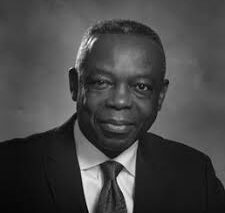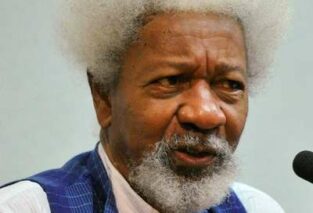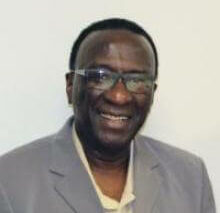Interviewed by L’Effort Camerounais journalist Grace Ongey
On Monday, October 13, 2008, employees of the Catholic Media House, known by its French acronym MACACOS, welcomed their new interim General Manager, Mr. Emile Clément Abondo. The Co-Adjutor Archbishop, Monsignor Samuel Kleda, presided at the short ceremony in the Company’s conference hall. After the ceremony, L’Effort Camerounais journalist Grace Ongey spoke with the outgoing General Manager, Martin Jumbam, about his tenure of office. Excerpts
For how long have you been serving this company?
I have been the General Manager for four years although I cannot really be said to be a new person in MACACOS. Before I became the General Manager, I had been around for close to ten years. I came here in 1995 when MACACOS was not yet created. Back then, His Eminence Christian Cardinal Tumi, the Archbishop of Douala, invited me to join Ariane Janotto, a French journalist sent by an Italian non-governmental organization, Centro Orientamento Educativo (COE), at the invitation of the Cardinal, to revive the Catholic newspaper, L’Effort camerounais. Cardinal Tumi received the mission from his fellow bishops of the National Episcopal Conference of Cameroon to revive this voice of the Church that was almost dead. That was when he decided that the revived paper would reflect the bilingual status of our country; and so he asked me to put English into it, which I happily did. At that time, I was working fulltime for the Douala-based American oil company, Pecten Cameroon. So I began to work on the paper on a voluntary basis, as my own way of giving something back to the Church. That year, 1995, the Holy Father Pope John Paul II was visiting Cameroon for the second time and L’Effort camerounaiscovered that event extensively in English and French. Since then, I’ve been very much present in the house. In 2004, when I took an early retirement package from Pecten Cameroon, the Cardinal asked me to help him run the entire company.
Why did you leave Pecten?
Well, I took advantage of an early retirement package which that company offered me and left with the intention of setting up a translation agency of my own when His Eminence Cardinal Tumi asked me to take over the company from Benoit Marie Mellet, a French volunteer worker from FIDESCO. That was in November 2004. So this November would’ve made me exactly four years at the helm of this company.
So why are you leaving MACACOS?
We must move on. I feel I should do something on my own and leave the younger generation to run the company. I took over a company in good financial standing. We had about 54 employees at the time. Today, we are close to 67 employees. The reason the number of employees increased is because we have incorporated the journalists of Radio Veritas into the company’s workforce. Soon Videopro, the video production unit, will also become part of the entire business, further increasing the number of employees on the company’s payroll.
How do you feel as you move on?
I feel sad leaving. It’s sad to leave people you’ve led for this many years. You know when you hold a position of responsibility it’s not always easy to let go, especially when things are not moving too badly. I met a company that was financially viable and I’m happy I’m leaving it still financially upright, the general global economic recession notwithstanding.
How did you successfully manage this company in a society like ours that is plagued by corrupt practices?
One thing Cardinal Tumi has been emphatic on is that we do business in an ethical manner. We are required to respect all the laws of the country; pay all legal taxes promptly and never, never ever give or accept a bribe for any reason whatsoever. Because we would not do like everybody else, we sometimes face challenging conditions at the port, at the customs or at the police, but we never buy our way through any difficulty. We want to show that it is possible to do business ethically even in a corruption-rife environment like ours.
Isn’t that a very expensive way of doing business?
You’re right, when you decide to do business in this country ethically, refusing to give a bribe or to corrupt your way through, you are heavily penalised for it. Since we don’t bribe customs officers, we sometimes pay heavy charges for our goods to get through customs. But we prefer to pay all the money to the State rather than to individuals to ease our business. Along those lines, I feel happy that I was able to respect the strict orders from our Archbishop to operate a business differently from everyone else. It also proves to me that even in a country like Cameroon, which has lifted the unenviable trophy of the most corrupt country on the planet two years in a row, quite a record!, it is still possible to do business the way a business should be done, refusing to give bribes or ask for any.
After serving as General Manager for four years, in what state are you leaving MACACOS?
As I mentioned earlier, I am leaving a company behind me that is fairly healthy despite the difficult market situation. I went to India not long ago and bought a new four-colour machine, a real jewel in our fleet of machines. We hope it will bring us more clients. We’re happy to see that those who had left because we did not produce very good quality products are now coming back because of this equipment. We took a big loan from the Archdiocese to buy the machine in question and we have to repay that loan. I am quite confident of the ability of MACACOS to survive the hard economic times. After all, it’s not only MACACOS facing such adverse times. Others in the same field are even worse off than we are; some are not even able to pay their workers.
Did you pay your workers regularly then?
Yes, we did and still do. One thing the Cardinal told me very clearly was never to propose salaries we cannot pay. We just have to make sure that the little we promise, we pay regularly. Each month, employees receive their salaries on time. As you know, MACACOS prints nearly three quarters of the newspapers in circulation in Cameroon, among which are three dailies (Mutations, Le Messager and Popoli), which is quite laudable. The overall charges are very high because we have to import just about everything for the printing press: paper, ink, plates, etc; and with the price of things in the world market today being so high, we have to spend a lot of money to bring these raw materials into the country. You know in Cameroon many people have printing presses even in their bedrooms and so the competition is really rough but, even with that, we are still holding our own in the very highly competitive world of the printing press.
What is your next plan of action?
I am a translator and a conference interpreter by training, I also do freelance work in Journalism. My wife, Hermine, and I run a language center, the American Language Center of Douala. That’s where I will spend much of my time. I believe I have done my best in MACACOS and its time to move on; it’s time to hand the relay baton to a much younger generation. You know, what kills us in this country is the reluctance of the older generation to leave and give the younger generation a chance to show what they’re capable of. In my case, I believe I’ve run a good race and can now hand the baton to someone else. I also need some time for myself and for my family. I am a father of three: one girl and two boys. Although my children are not here with us, my wife is here and I need to take care of her as well. I have to be around her so she doesn’t feel too lonely.
Do you believe you’ve achieved the task assigned you?
To the best of my ability, yes, I have. I tried to live up to the promise I made to the Cardinal, which is that I would manage the assets of the company in as transparent a manner as I could. The other day, when the accountant and the financial controller finished their work and gave MACACOS a clean financial bill of health, I felt vindicated. I can proudly say that my tour of duty has, to a considerable extent, been a successful one. I was out to protect the assets of the company and that is what I think I did, to the best of my ability. I was a mere custodian of those assets and I believe I’ve handed them back to the Archdiocese in good shape. That is why I leave here feeling satisfied that I did try to do what was assigned to me. There were, of course, shortcomings here and there, as no work of human hands is ever perfect, but, on the whole, I leave with my head held high.


